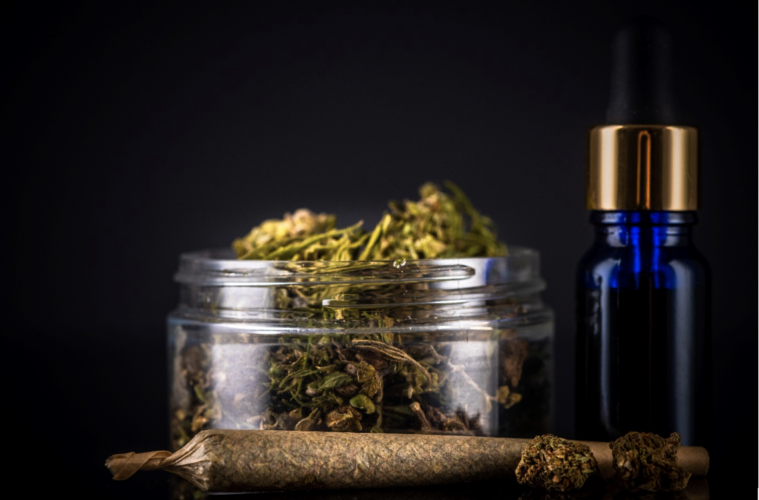Delta-8 THC is found in trace amounts in cannabinoid plants such as hemp and marijuana. As of 2018, after the passing of a long-awaited Farm Bill, hemp and derivatives of the cannabis plant that contain low amounts of Delta 9 THC (no more than 0.3 percent of dry weight) were separated from marijuana as far as the Controlled Substances act (CSA) was concerned. This meant that hemp was no longer classified as a Schedule I substance, and was now subject to the Food and Drug Administration (FDA) instead of the Drug Enforcement Administration (DEA).
It was now legal to grow hemp across the United States, and derivatives of the hemp plant were no longer controlled substances. Substances extracted from the plant were now totally legal, as they fell under the definition of hemp. This led to the proliferation of hemp-based products like CBD. In 2020, The DEA issued an interim rule stating that “All synthetically derived THC remain Schedule 1 controlled substances”.
Why there’s a problem
You should be able to see why the legality of Delta-8 THC has been the subject of so much confusion. Marijuana is a controlled substance due to an abundance of Delta 9 THC, while hemp is not controlled and is completely legal to grow and sell. Hemp-derived chemicals like CBD have been the subject of much clinical research, and are administered as medicine. Delta-8 THC, however, is not extracted from the hemp plant, and is instead produced chemically through the isomerization of CBD that may have been extracted from hemp. The chemical nature of the production process means that Delta-8 THC is a synthetic cannabinoid, and therefore a controlled substance, at least at the federal level.
Things are very different when you look from state to state. States are liable to overrule federal laws to act in their own best interests. However, given that Delta-8 is a relatively unknown and decidedly minor cannabinoid, the fact of the matter is that the majority of states simply don’t address it directly in their legislature, and the status of its legality is instead inferred through their legislature regarding hemp-derivatives, cannabis or other similar substances. What this means is that, contrary to popular belief, Delta-8 isn’t really legal in any state; rather, it’s just not explicitly illegal in certain jurisdictions. In others, such as Alaska, it has been explicitly categorized as illegal, given its ability to intoxicate.
The list
Lets take a look at each state:
- Alabama: It is legal to grow, sell, or consume Delta-8 THC products in Alabama.
- Alaska: It is NOT legal to grow, sell, or consume Delta-8 THC products in Alaska.
- Arizona: It is NOT legal to grow, sell, or consume Delta-8 THC products in Arizona.
- Arkansas: It is NOT legal to grow, sell, or consume Delta-8 THC products in Arkansas.
- California: It is legal to grow, sell, or consume Delta-8 THC products in California.
- Colorado: It is NOT legal to grow, sell, or consume Delta-8 THC products in Colorado.
- Connecticut: It is legal to grow, sell, or consume Delta-8 THC products in Connecticut.
- Delaware: It is NOT legal to grow, sell, or consume Delta-8 THC products in Delaware.
- Florida: It is legal to grow, sell, or consume Delta-8 THC products in Florida.
- Georgia: It is legal to grow, sell, or consume Delta-8 THC products in Georgia.
- Hawaii: It is legal to grow, sell, or consume Delta-8 THC products in Hawaii.
- Idaho: It is NOT legal to grow, sell, or consume Delta-8 THC products in Idaho.
- Illinois: It is legal to grow, sell, or consume Delta-8 THC products in Illinois.
- Indiana: It is legal to grow, sell, or consume Delta-8 THC products in Indiana
- Iowa: It is NOT legal to grow, sell, or consume Delta-8 THC products in Iowa.
- Kansas: It is legal to grow, sell, or consume Delta-8 THC products in Kansas.
- Kentucky: It is NOT legal to grow, sell, or consume Delta-8 THC products in Kentucky.
- Louisiana: It is legal to grow, sell, or consume Delta-8 THC products in Louisiana.
- Maine: It is legal to grow, sell, or consume Delta-8 THC products in Maine.
- Maryland: It is legal to grow, sell, or consume Delta-8 THC products in Maryland.
- Massachusetts: It is legal to grow, sell, or consume Delta-8 THC products in Massachusetts.
- Michigan: It is legal to grow, sell, or consume Delta-8 THC products in Michigan.
- Minnesota: It is legal to grow, sell, or consume Delta-8 THC products in Minnesota.
- Mississippi: It is NOT legal to grow, sell, or consume Delta-8 THC products in Mississippi.
- Missouri: It is legal to grow, sell, or consume Delta-8 THC products in Missouri.
- Montana: It is NOT legal to grow, sell, or consume Delta-8 THC products in Montana.
- Nebraska: It is legal to grow, sell, or consume Delta-8 THC products in Nebraska.
- Nevada: It is legal to grow, sell, or consume Delta-8 THC products in Nevada.
- New Hampshire: It is legal to grow, sell, or consume Delta-8 THC products in New Hampshire.
- New Jersey: It is legal to grow, sell, or consume Delta-8 THC products in New Jersey.
- New Mexico: It is legal to grow, sell, or consume Delta-8 THC products in New Mexico.
- New York: It is NOT legal to grow, sell, or consume Delta-8 THC products in New York.
- North Carolina: It is legal to grow, sell, or consume Delta-8 THC products in North Carolina.
- North Dakota: It is NOT legal to grow, sell, or consume Delta-8 THC products in North Dakota.
- Ohio: It is legal to grow, sell, or consume Delta-8 THC products in Ohio.
- Oklahoma: It is legal to grow, sell, or consume Delta-8 THC products in Oklahoma.
- Oregon: It is legal to grow, sell, or consume Delta-8 THC products in Oregon.
- Pennsylvania: It is legal to grow, sell, or consume Delta-8 THC products in Pennsylvania.
- Rhode Island: It is NOT legal to grow, sell, or consume Delta-8 THC products in Rhode Island.
- South Carolina: It is legal to grow, sell, or consume Delta-8 THC products in South Carolina.
- South Dakota: It is legal to grow, sell, or consume Delta-8 THC products in South Dakota.
- Tennessee: It is legal to grow, sell, or consume Delta-8 THC products in Tennessee.
- Texas: It is legal to grow, sell, or consume Delta-8 THC products in Texas.
- Utah: It is NOT legal to grow, sell, or consume Delta-8 THC products in Utah.
- Vermont: It is NOT legal to grow, sell, or consume Delta-8 THC products in Vermont.
- Virginia: It is legal to grow, sell, or consume Delta-8 THC products in Virginia.
- Washington: It is NOT legal to grow, sell, or consume Delta-8 THC products in Washington State.
- West Virginia: It is legal to grow, sell, or consume Delta-8 THC products in West Virginia.
- Wisconsin: It is legal to grow, sell, or consume Delta-8 THC products in Wisconsin.
- Wyoming: It is legal to grow, sell, or consume Delta-8 THC products in Wyoming.
It is important to note that most states are currently involved in the process of updating their legislature to handle the cornucopia of minor cannabinoids that have popped up in recent history, and will no doubt continue to pop up in the near future. The contents of the above list are, as such, bound to change considerably as the situation develops further. While we’ve done our due diligence in compiling this information, we’d urge you to check back from time to time so that you remain abreast of the situation. Toke safe everyone!
Advertising disclosure: We may receive compensation for some of the links in our stories. Thank you for supporting LA Weekly and our advertisers.


